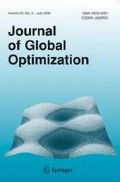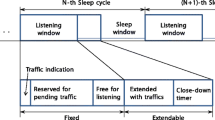Abstract
In order to improve the efficiency of the power saving mechanism and to save more resources in WiMAX, and also to consider the property of self-similar traffic shown widely in the networks with multimedia transmission, we present a new method to analyze the performance of an enhanced power saving class type III in IEEE 802.16 with self-similar traffics. According to the operating principle of the sleep mode in the enhanced power saving class type III, considering the self-similar nature of massive multimedia packets in wireless mobile networks, a discrete-time batch arrival multiple vacation queueing model with vacation-delay is built. The batch size is supposed to be Pareto distributed. The boundary state variable theory for the batch arrival vacation queueing model is presented, and then the queueing measures such as queueing length, waiting time and busy cycle in steady state are given. Moreover, we derive explicitly the performance measures in terms of the handover ratio, the energy saving ratio, the system utility and the average response time of packets. Finally, numerical results are given to demonstrate the influence of the system parameters on the system performance with different offered loads and different degrees of self-similar traffics. This paper provides a theoretical basis for the optimal design of the power saving mechanism in the IEEE 802.16, and has potential applications for solving other energy conservation related problems in wireless mobile networks.
Similar content being viewed by others
References
IEEE 802.16-2009: IEEE Standard for Local and Metropolitan Area Networks, Part 16: Air Interface for Fixed and Mobile Broadband Wireless Access Systems, IEEE Standards Association (2009)
Enders J., Powell W., Egan D.: A dynamic model for the failure replacement of aging high-voltage transformers. Energy Syst. 1(1), 31–59 (2010)
Hu Q., Yue W.: Two new optimal models for controlling discrete event systems. J Ind. Manag. Optim. 1(1), 65–80 (2005)
Hu Q., Yue W.: Optimal control for resource allocation in discrete event systems. J. Ind. Manag. Optim. 2(1), 63–80 (2006)
Huo Z., Yue W., Tian N., Jin S.: Performance evaluation for the sleep mode in the IEEE 802.16e based on a queueing model with close-down time and multiple vacations. J. Ind. Manag. Optim. 5(3), 511–524 (2009)
Hwang E., Kim K., Son J., Choi D.: The power saving mechanism with binary exponential traffic indications in the IEEE 802.16e/m. Queueing Syst. 62(3), 197–227 (2009)
Hwang E., Kim K., Choi D.: Delay distribution and loss probability of bandwidth requests under truncated binary exponential backoff mechanism in IEEE 802.16e over gilbert-elliot error channel. J. Ind. Manag. Optim. 5(3), 525–540 (2009)
Jin, S., Han, L., Yue, W.: Performance evaluation for the power saving class of type III with sleep-delay in IEEE 802.16e. In: Proceedings of the 4th International Conference on Queuing Theory and Network Applications, CD-ROM, 6 pp (2009)
Jin S., Yue W.: Performance analysis for a system of connection oriented Internet service with a release delay. IEICE Trans. Commun. E90-B(11), 3083–3094 (2007)
Khaitan S., McCalley J., Raju M.: Numerical methods for on-line power system load flow analysis. Energy Syst. 1(3), 273–289 (2010)
Knopov P., Pardalos P.: Simulation and Optimization Methods in Risk and Reliability Theory. Nova Science Publishers, New York (2009)
Kong, L., Tsang, D.: Performance study of power saving classes of type I and II in IEEE 802.16e. In: Proceedings of the 31st IEEE Conference on Local Computer Networks, pp. 20–27 (2006)
Min M., Pardalos P.: Total energy optimal multicasting in wireless ad hoc networks. J. Comb. Optim. 13(4), 365–378 (2007)
Niu, Z., Zhu, Y.: A phase-type based Markov chain model for IEEE 802.16e sleep mode and its performance analysis. In: Proceedings of the International Teletraffic Congress, pp. 791–802 (2007)
Resende M., Pardalos P.: Handbook of Optimization in Telecommunications. Springer, Berlin (2006)
Tian N., Zhang G.: Vacation Queueing Models—Theory and Applications. Springer, Berlin (2006)
Tian, N., Xu, X., Ma, Z.: Discrete Time Queueing Theory. Beijing Science Publishers (2008, in Chinese)
Wu W., Gao X., Pardalos P., Du D.: Wireless networking, dominating and packing. Optim. Lett. 4(3), 347–358 (2010)
Xiao Y.: Energy saving mechanism in the IEEE 802.16e wireless MAN. IEEE Commun. Lett. 9(7), 595–597 (2005)
Author information
Authors and Affiliations
Corresponding author
Rights and permissions
About this article
Cite this article
Jin, S., Yue, W. & Han, L. Performance analysis and evaluation of an enhanced power saving class type III in IEEE 802.16 with self-similar traffic. J Glob Optim 52, 353–367 (2012). https://doi.org/10.1007/s10898-011-9681-6
Received:
Accepted:
Published:
Issue Date:
DOI: https://doi.org/10.1007/s10898-011-9681-6




